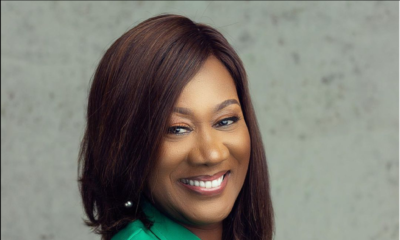Career
Money Matters with Nimi: So, With All That Is Going On With The World… Have You Taken a Good Look at Your Finances?
If you have not got a budget in place and you haven’t paid any attention to your debt, it will be difficult for you to save; they are all connected. You need to find the discipline to develop the budget, pay down or at least reduce your debt and then start to increase your savings.
 Mid-July already! Most of us had such noble plans at the start of the year. In January, the plan was to start afresh in a new decade, do the right things, and work towards exciting goals. Nothing could have prepared us all for a global pandemic that has turned our world upside down. What happened to the personal, financial and professional goals or plans that you were set to accomplish this year? How have you fared? Have you made any progress? When was the last time you reviewed those goals?
Mid-July already! Most of us had such noble plans at the start of the year. In January, the plan was to start afresh in a new decade, do the right things, and work towards exciting goals. Nothing could have prepared us all for a global pandemic that has turned our world upside down. What happened to the personal, financial and professional goals or plans that you were set to accomplish this year? How have you fared? Have you made any progress? When was the last time you reviewed those goals?
If you are one of those that keeps putting off that dreaded dental check-up until you are in agony, stop it; it only causes things to fester and then turns into a nightmare. It is the same with your personal finances. It is important to review the progress you are making with your personal finances periodically. Half way through the year is a good time to reflect on your goals and plans, take stock, and see if you have lived up to your own expectations. It is a time to identify any festering problems and to make adjustments as necessary.
It is so easy to make excuses about non-performance; indeed Covid-19, the Coronavirus, has become a top reason for not achieving anything, yet for some this has been a most productive time as they seize opportunities and make the best of these unusual times.
With barely five months left to go this year, carve out time, say an hour or two before the end of this month to look over your finances to see how far you have come these past six months. If you’ve made some progress in even two or three of the areas below, that is progress.
Have you invested in yourself?
Your human capital is by far your most important asset as it encompasses your essence, your knowledge and skills. One thing we can’t complain about is the amount of time we have had on our hands, that we’ve never had before.
How are you using this extra time? Have you invested in improving yourself, reading, attending courses and webinars or even gaining a formal certification in an area of interest? You can significantly improve your prospects by developing yourself.
Did you put a budget in place?
Do you have a clear idea of how much you are spending each week, or month? Yes, your income may have dropped but you have saved in others such as transport and travel, and regrettably, entertainment. Have you tracked your expenses for a period and developed a clear picture of what can be cut back? You can use one of many on line tools or just simply get out a pad of paper and track your expenses manually. You need to know where your money is going.
Have you reduced your debt?
The use of debt can be one of the most effective ways to grow your wealth, when it is used for assets that are likely to increase in value such as for the purchase of property. On the other hand, debt abused and used for lifestyle and luxuries can get out of control and land you in a dire situation.
Have you taken steps to reduce your debt and do you carry less debt today than you did on January 1st? Until you start to face up to your debt, it will continue to grow.
The general rule of thumb and the fastest way to reduce your debt is to tackle your most expensive or the most urgent debt first. By automating your debt payments and making incremental principal payments each month, you will soon find your debt is under control. Don’t ignore your debt or wish it away; if it becomes a burden, approach your lender and discuss the possibilities for rescheduling to make it more manageable.
Are you building your savings?
If you have not got a budget in place and you haven’t paid any attention to your debt, it will be difficult for you to save; they are all connected. You need to find the discipline to develop the budget, pay down or at least reduce your debt and then start to increase your savings.
Most financial advisors suggest that you should save between 10% and 15% or more of your income. Have you built an emergency fund over these past six months? Emergency funds have been a life-line for thousands of Nigerians during this time as so many faced job losses, and unexpected medical and other expenses. With a financial cushion to fall back on, you are better prepared to cope with emergencies and can better support your loved ones.
One of the greatest advantages of the lock down was that those that were lagging with online banking were forced to embrace technology; this is great news for your savings. The easiest way to start to grow your savings is to automate it by putting a direct debit in place so that you won’t be tempted to spend all your income but rather it can be directed to an appropriate savings vehicle. Most mutual fund companies make it easy for you to be able to automate your savings and investment plan. A regular savings and investment plan is a powerful way of building wealth and future financial security.
How are your investments doing?
Your stock portfolio may have taken a bashing in the bear market, but that is only if you sold shares in a panic. You might consider taking advantage of the discounted prices on some great blue-chip stocks if you are in a position to do so. Investing regularly in good times and in bad, a strategy known as cost averaging reduces the overall average cost of your purchases.
Do you own property? Is rent due or is your tenant struggling to pay? There are important conversations to have and most importantly it is best to have a property let to the right tenant than to have it empty for months at a time. Negotiate terms and try to retain good quality tenants.
Asset prices have generally fallen so it is a great time for those interested to take advantage of great investment opportunities in stocks, property and business.
Have you protected your assets?
Don’t let your insurance lapse. Review your insurance for your car, home, health and life. This is one of the best gifts you can give yourself at this time. Protect what you have. Insurance was created for times like this. Visit a leading insurance company and see what is on offer; from car insurance, household insurance, educational insurance, to life insurance, which comes with a job loss component, and much needed health insurance policies. Give yourself peace of mind.
Have you made a will?
Too many people avoid dealing with their mortality because thinking about death makes them feel uncomfortable. However, dying without a will, or a will that is out-of-date, can cost your loved ones so much pain and throw away decades of hard work. Knowing that your young children will be cared and provided for should anything happen to you, will give you peace of mind.
If you already have a will, when last did you review and update it to make sure you have included any recently acquired assets or new beneficiaries. Circumstances change. Perhaps your assets have grown or shrunk? Maybe you have had children or grandchildren since you wrote your last will.
Don’t be complacent about Covid-19
Health is wealth. Are you taking steps to safeguard your health? Covid-19 is still very much alive and in our midst. Don’t be complacent about strictly following the necessary protocols; wear a mask, keep your social distance, wash your hands frequently, use a sanitizer as necessary and avoid crowds. If you can, just stay at home unless absolutely necessary. Our personal behavior and sense of responsibility is what will beat this virus, get our economy back to work and improve both our personal and business finances.
By maintaining good health or taking active steps to improve it through exercise, a healthy diet and lifestyle, you could save yourself significant health and medical costs in future and be in a position to fully enjoy the wealth that you have created.
A major difference between those who enjoy financial security and those who do not, is simply the discipline to do something about their financial situation versus procrastinating and never getting round to it. To which camp do you belong? If you are on track, congratulations! If not, don’t worry, there is still some way to go this year to put things right, but do get started.



















